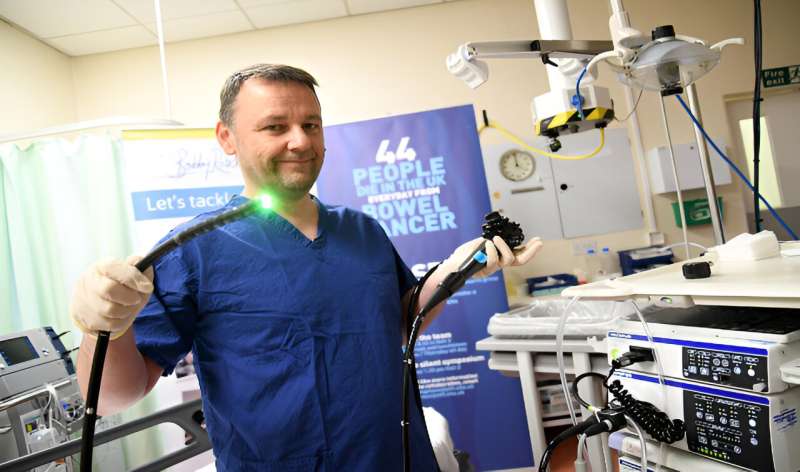This article has been reviewed according to Science X's editorial process and policies. Editors have highlighted the following attributes while ensuring the content's credibility:
fact-checked
peer-reviewed publication
trusted source
proofread
AI shows greater efficiency in detecting early signs of bowel cancer

Newcastle University has led a successful trial using artificial intelligence (AI) in colonoscopies to spot abnormalities that could potentially lead to bowel cancer.
Newcastle University, South Tyneside and Sunderland NHS Foundation Trust led the COLO-DETECT trial involving 2,032 patients from 10 centers across England. The research is published in The Lancet Gastroenterology & Hepatology journal.
The trial used the GI Genius AI device, a computer module powered by AI, which is added to the existing technology used during a colonoscopy. The findings showed greater effectiveness in detecting tumors that could potentially become cancerous (adenomas).
As a result, the Trust will continue to make the equipment available to its teams based at Endoscopy units at South Tyneside District Hospital and Sunderland Royal Hospital.
'It is spotting things we can miss with the human eye'
Professor Colin Rees, who led the trial, and Professor of Gastroenterology at Newcastle University, said, "We are delighted with the outcome of this trial. Simply put, it will save lives.
"This trial has demonstrated that using artificial intelligence can significantly increase detection of the kinds of abnormalities in the bowel that may progress to cancer. It allows us to find these lesions, remove them, and stop them from turning into cancer.
"Crucially, we know that some of the polyps that lead to cancer are small polyps or flat polyps. The AI helped us find more of these lesions, it is finding the things we are concerned about as well as spotting things that we can miss with the human eye."
'It is only going to get better'
COLO-DETECT was a randomized controlled trial, with half of the 2,032 participants in the procedure having a colonoscopy using AI, and the other half having a "traditional" colonoscopy.
A colonoscopy is a procedure where a camera is used to look inside the bowel, with the aim of spotting cancerous and precancerous polyps (adenomas).
The trial involves putting a green box around possible polyps on the screen, which shows what the camera can see, with the clinician ultimately deciding whether to remove the polyp.
There are around 43,000 new cases of bowel cancer in the U.K. each year, and Professor Rees hopes this technology will now be adopted more widely to detect early signs of the disease.
Professor Rees added, "It is a tragedy because bowel cancer is a disease that people shouldn't be dying from. We have a long window of time when these polyps develop, probably about 10 to 15 years from developing to a point to them becoming cancer.
"We are now using this technology routinely in our practice, and I really hope that it will be used more extensively, and the fantastic thing about AI is that it learns. It is trained by looking at images, using the data to find the differences between the images, and it is adding to its knowledge all the time, so it's only going to get better."
More information: Alexander Seager et al, Polyp detection with colonoscopy assisted by the GI Genius artificial intelligence endoscopy module compared with standard colonoscopy in routine colonoscopy practice (COLO-DETECT): a multicentre, open-label, parallel-arm, pragmatic randomised controlled trial, The Lancet Gastroenterology & Hepatology (2024). DOI: 10.1016/S2468-1253(24)00161-4



















